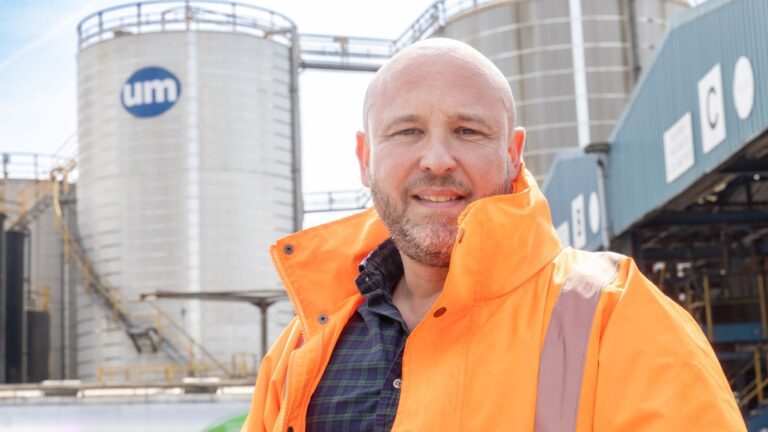
The United Molasses (UM) Group and its subsidiaries are focused on the global trading and marketing of molasses, molasses related products, and the provision of bulk liquid storage services to third party customers.
UM Terminals owns all its storage assets in Great Britain and has over 265,000 cubic metres located in Liverpool, Hull, Portbury and Hamburg. It is a niche supplier of bulk liquid storage facilities to the food, industrial, feed and energy sectors in the UK. .
What is the ambition for the UM Group?
The UM Group is a diverse business, with its main interests in the marketing, sales and trading of Molasses in a global market. In addition to this we have a terminals business that integrates with our molasses operations and provides bulk liquid storage to third parties globally with significant operations in the UK and Ireland.
Regarding the terminals business, the area of the business on which I lead, our ambition is to add value to bulk liquid supply chains by driving innovation and being easy to do business with.
Our team of technical experts are proactive, providing solutions to our customers in a quick and efficient way which enables them to build their business and reduce their operating cost. We want to build on these simple values to help us grow our business and become the best in the industry. We are not the largest terminal operator, but we are certainly the best, when it comes to service.
What is your current role at the UM Group?
I have been with the UM Group for two years, having joined the business as Managing Director for the GB Terminals Business. I recently took on a broader role as Group Terminals Director, overseeing business operations at all our terminals globally as well as creating a centralised function for asset management and health and safety.
We are currently, and very actively, looking to grow our storage offering commercially across all our global locations, and I’m driving the strategy behind delivering this plan.
Prior to joining the UM Group, I worked for Univar Solutions, as its Operations Director for Northern Europe. The role was centred around production, logistics and supply chain for an extensive portfolio of chemicals and ingredients. Prior to Univar I worked in the fuel distribution industry, as well as in biofuel production and infrastructure businesses.
How has the UM Group changed in your time with the company?
Speaking specifically for the terminals business, we have driven revenues by adapting our asset base to other sectors, specifically within biofuels and its associated feedstocks.
We have driven a best-in-class asset management and safety management system and have restructured our business around this. By driving better technical expertise within the business we can react quickly to customer enquiries and deliver solutions in a cost-effective and time-efficient manner.
This approach has helped us to drive growth and cement our reputation as a leading provider of bulk storage solutions. We are now in the process of delivering the same strategy across all our terminals globally.
UM Terminals has recently made a multi-million-pound investment in one of its key strategic terminals – the company’s Regent Road terminal in Liverpool – which is also home to its head office. What is the reason for that investment and how are developments so far?
Regent Road was an aged site stooped in UM history. However, due to the age and infrastructure constraints at the site, our ability to market real value-add solutions was limited.
We recognised the need to invest and upgrade the site and the investment we made allowed us to convert Regent Road into a flexible storage facility that could store a variety of products with a heavy emphasis on renewable fuels.
This investment programme is completed, and the terminal is now at 100% occupancy with a large throughput of HVO going through the terminal. This has been one of many success stories over the last two years.
With the Regent Road terminal development clearly a significant one for the business, what else is happening, both strategically and in terms of physical developments, as you adapt to the fuels of the future?
We have maximised our current position in terms of capability of storing fuels of the future and are currently storing a variety of renewable fuels for leading UK distributors and oil majors.
Our investments have been across our site network and are paying dividend as we have significantly increased our occupancy at all UK sites – particularly in the biofuels space.
Our asset base lends itself well to HVO, Biodiesel, ethanol and the like and we expect that customers in this sector will continue to come to us for bulk biofuel storage solutions.
Are the most significant changes in the fuel and energy sector, as it transitions to future fuel? Are there significant changes and challenges in other sectors or are they more stable?
The energy transition from hydrocarbons to renewable sources is by far the most prevalent we have seen over the past two years regarding demand for storage, both in terms of finished fuels and biofuel feedstocks.
Other markets appear to be currently more stable, however our commercial activity levels have increased as we have diversified how we do business and strengthened our organisational capability.
As an example, we are building a large new storage footprint on an existing site in Southern Ireland, working closely with the customer to understand its unique challenges and providing a time and cost-effective way to support their business growth through a strengthened supply chain.
Please tell us about your drive for sustainability. Clearly you are considering this at a corporate level, but how much are you encouraging the transition down the supply chain through your distributors?
Like most businesses we are very focused on our scope 1 emission reduction targets and, for the short to medium term, this will be our primary focus as it is well within our control and will make a deep impact on reducing our greenhouse gas emissions.
We have some ambitious targets, and we are close to finalising a strategy to reduce our scope 1 emissions by 50% by 2030, which I expect we will deliver on way ahead of time.
Is the UM Group involved with influencing legislative changes or lobbying government?
UM Terminals is an active member of the TSA (Tank Storage Association) which lobbies on behalf of the tank storage industry. The TSA is an industry-based organisation whose members are engaged in bulk storage and energy infrastructure and in the provision of products and services to the sector.
In the coming years, what do you see as major challenges to the industry and what will be the positives?
One of our greatest challenges currently, and for what looks like the medium term at least, is managing high operating costs.
The effects of having high inflation and a large increase in energy costs is increasing our cost base. In one way, it challenges us as an organisation to be more efficient, however, with a high cost of capital, it makes investing in new plant and equipment much more difficult.
Like most businesses we are transitioning to low carbon technology to reduce our carbon footprint.
What are the things that keep you awake at night?
Other than our new puppy Vinni, who is a three-month-old Chihuahua, probably like most people that are responsible for a significant operation in a high hazard industry, keeping people safe and injury free is at the forefront of every idea, decision or strategy I want to develop.
Ensuring UM has the right risk control measures in place across all our operations in the UK and globally is the highest on my agenda and always at the back of my mind.
What do you enjoy most about operating in the industry?
I very much consider myself as a problem solver. I started work life as an apprentice, became a chartered mechanical engineer and then went on to leadership roles.
Having provided engineered solutions, bringing the same thought processes into the commercial and organisational world works well for me. It allows me to cut through bureaucracy and unblock blockers, which gets things done quickly, efficiently and cost effectively.
Delivering solutions for new and existing storage customers in a very efficient and cost-effective way really sets UM apart from our competitors and this is what I enjoy the most about working in this industry.
What is the best piece of advice you have been given in this industry?
I have been fortunate enough to have had the opportunity to work for some exceptional industry leaders over the years. There are too many golden nuggets of advice to choose one, but here are a few that have stuck with me:
• “If we don’t have a safe organisation, one day we won’t have an organisation.”
• “Good culture is more important than good numbers – achieve the first and the second will come.”
• “Enjoy the journey rather than getting stressed about reaching the destination on time.”
• “Don’t ask anyone to do anything you’re not prepared to do yourself.”
• “When on a night out…. “Nothing interesting ever happens after midnight!”
Looking to the future what is the vision for the company?
Our vision is simple – to stick to what we do best and provide a premier level of service in the storage tank industry. We are not the biggest player in the UK storage market, but by providing a best-in-class service, we can manage our margins well and deliver incremental growth in both our storage business and in our additional value-add services.
Image provided by UM Terminals
